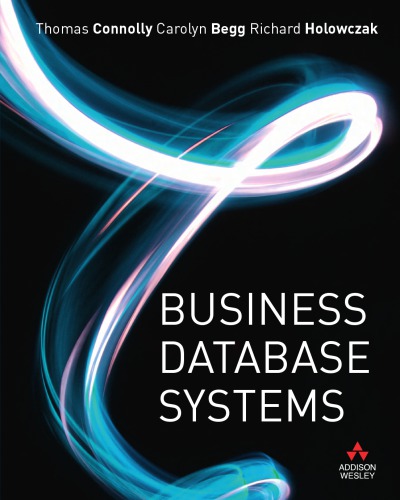

Most ebook files are in PDF format, so you can easily read them using various software such as Foxit Reader or directly on the Google Chrome browser.
Some ebook files are released by publishers in other formats such as .awz, .mobi, .epub, .fb2, etc. You may need to install specific software to read these formats on mobile/PC, such as Calibre.
Please read the tutorial at this link: https://ebookbell.com/faq
We offer FREE conversion to the popular formats you request; however, this may take some time. Therefore, right after payment, please email us, and we will try to provide the service as quickly as possible.
For some exceptional file formats or broken links (if any), please refrain from opening any disputes. Instead, email us first, and we will try to assist within a maximum of 6 hours.
EbookBell Team

5.0
80 reviews
ISBN 10: 1405874376
ISBN 13: 9781405874373
Author: Thomas Connolly, Richard Holowczak, Carolyn Begg
Business Database Systems arms you with the knowledge to analyse, design and implement effective, robust and successful databases. This book is ideal for students of Business / Management Information Systems, or Computer Science, who will be expected to take a course in database systems for their degree programme. It is also excellently suited to any practitioner who needs to learn, or refresh their knowledge of, the essentials of database management systems. The full text downloaded to your computer With eBooks you can: search for key concepts, words and phrases make highlights and notes as you study share your notes with friends eBooks are downloaded to your computer and accessible either offline through the Bookshelf (available as a free download), available online and also via the iPad and Android apps. Upon purchase, you'll gain instant access to this eBook. Time limit The eBooks products do not have an expiry date. You will continue to access your digital ebook products whilst you have your Bookshelf installed.
Part I Background
Chapter 1 Introduction
Preview
Learning objectives
1.1 Examples of the use of database systems
1.2 Database approach
1.3 Database design
1.4 Historical perspective of database system development
1.5 Three-level ANSI-SPARC architecture
1.6 Functions of a DBMS
1.7 Advantages and disadvantages of the database approach
Chapter summary
Review questions
Exercises
Chapter 2 The relational model
Preview
Learning objectives
2.1 Brief history of the relational model
2.2 What is a data model?
2.3 Terminology
2.4 Relational integrity
2.5 Relational languages
Chapter summary
Review questions
Exercises
Chapter 3 SQL and QBE
Preview
Learning objectives
3.1 Structured Query Language (SQL)
3.2 Data manipulation
3.3 Query-By-Example (QBE)
Chapter summary
Review questions
Exercises
Chapter 4 The database system development lifecycle
Preview
Learning objectives
4.1 The software crisis
4.2 The information systems lifecycle
4.3 The database system development lifecycle
4.4 Database planning
4.5 System definition
4.6 Requirements collection and analysis
4.7 Database design
4.8 DBMS selection
4.9 Application design
4.10 Prototyping
4.11 Implementation
4.12 Data conversion and loading
4.13 Testing
4.14 Operational maintenance
Chapter summary
Review questions
Part II Database analysis and design techniques
Chapter 5 Fact-finding
Preview
Learning objectives
5.1 When are fact-finding techniques used?
5.2 What facts are collected?
5.3 Fact-finding techniques
5.4 The StayHome Online Rentals case study
Chapter summary
Review questions
Exercise
Chapter 6 Entity–relationship modeling
Preview
Learning objectives
6.1 Entities
6.2 Relationships
6.3 Attributes
6.4 Strong and weak entities
6.5 Multiplicity constraints on relationships
6.6 Attributes on relationships
6.7 Design problems with ER models
Chapter summary
Review questions
Exercises
csus database systems for business mis150
database management systems in business
business rules in database systems
conference on database systems for business technology and web
database systems for business mis150
business database example
Tags: Thomas Connolly, Richard Holowczak, Carolyn Begg, database, Business